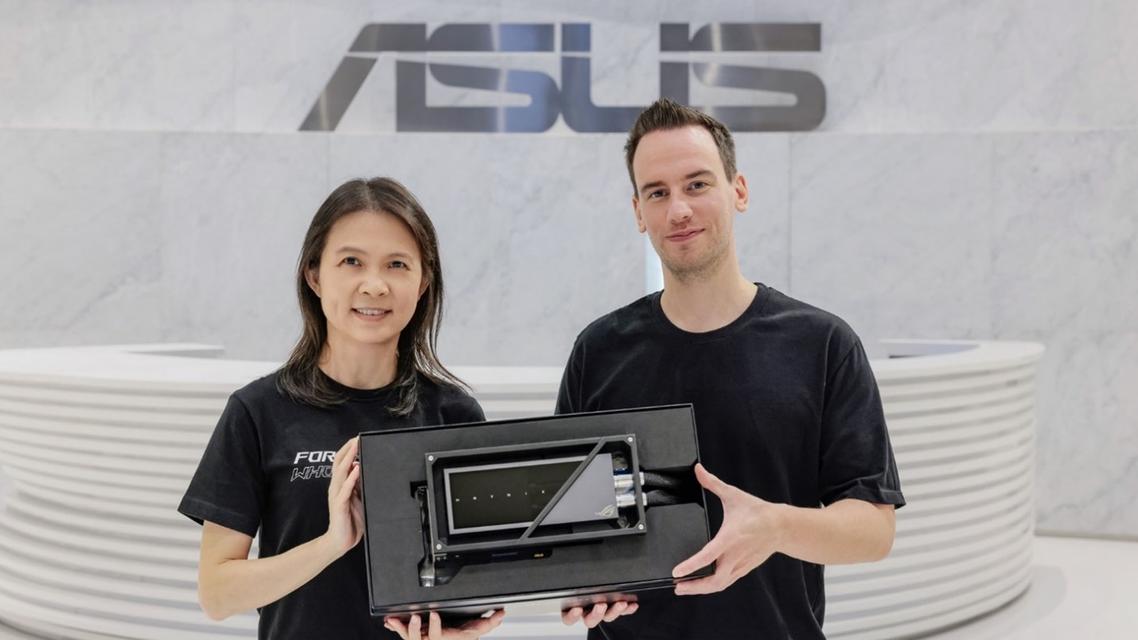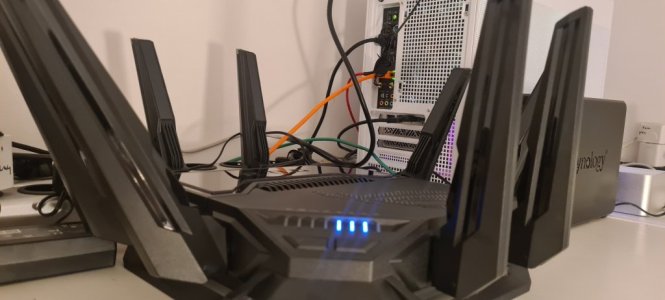This (not just the quoted part) was how having two 5GHz radios per unit 'limited' things for you? BTW, it would seem that if you'd wanted clients to "stick" to their AP radio better, you went the wrong direction with those settings, though it's a moot point now.... attempted to adjust the RSSI settings in the WebGUI to allow one unit to hand off the respective clients to the other at a higher dBM/shorter range eg. -47 to -57 vs the default -67 dBM. However, that did not fix the problem.
You are using an out of date browser. It may not display this or other websites correctly.
You should upgrade or use an alternative browser.
You should upgrade or use an alternative browser.
GT-BE98 WIFI 7
- Thread starter John Fitzgerald
- Start date
Yes, limitation in terms of multi gig speeds has been a long-time pet peeve of mine be it on Wifi or Ethernet. Though I do acknowledge the flexibility that an additional band can provide especially for those with plenty more IoT and other devices to handle as well as those where wireless backhaul is a necessity.This (not just the quoted part) was how having two 5GHz radios per unit 'limited' things for you?
I guess so. To be honest, I wasn't exactly stoked about the quad-band feature back then as I was already quite comfortable with the dual and tri-band setups of my previous two routers. I purchased them (GT-AXE16000s) for the dual 10Gbe ethernet ports to replace the RT-AX89X, which instead turned out to be the better performing router of the two in the end IMHO.BTW, it would seem that if you'd wanted clients to "stick" to their AP radio better, you went the wrong direction with those settings, though it's a moot point now.
Anyway, I think we should move on from here since its getting a little off-topic.
Reiterating my view/hope that MLO and AFC (when available) will help enhance/fix quad-band networking in the Wifi 7 era and by extension, the GT-BE98 and Pro models.
Last edited:
residualimages
New Around Here
https://www.newegg.com/asus-gt-be98-pro/p/N82E16833320588?Item=N82E16833320588 shows 12/6/2023 in stock (from backorder) ETA.
D
Deleted member 77025
Guest
Currently 1k+ on Amazon and other Sellers the cheapest is arround 850€ in Europe, insane those prices 
Better waiting for a new year deal on asus so the price maybe drop to arround 650€ again with a big annoucement on WiFi7
as they currently maybe looking more into Ai Sales on cards like the 4090 with liquid metal cooling for 2024
so WiFi7 could be in other words just another mess "get some money in my pocket" and wait for 2025 and WiFi8 
Better waiting for a new year deal on asus so the price maybe drop to arround 650€ again with a big annoucement on WiFi7
as they currently maybe looking more into Ai Sales on cards like the 4090 with liquid metal cooling for 2024
AquaVulcan
New Around Here
AquaVulcan
New Around Here
Yes, you can turn it off. I have GT-BE98 and confirmed this.I’m hoping you can disable the band splitting in the GT-BE98. If not I’m going for the RT-BE96U.
D
Deleted member 77025
Guest
https://www.newegg.com/asus-gt-be98-pro/p/N82E16833320588?Item=N82E16833320588 shows 12/6/2023 in stock (from backorder) ETA.
800$
Kingp1n
Very Senior Member
I saw this...anyone seen the non-pro version yet and i wonder how much it will be?800$
D
Deleted member 77025
Guest
non Pro is @850-870€ in Germany.
 direkt.jacob.de
direkt.jacob.de
on Amazon its currently 1k+. and I dont see any other Sellers.
Maybe its also because of the current winterdeals 2023.

 webshop.asus.com
webshop.asus.com
ASUS WL-Router GT-BE98 90IG08F0-MO9A0V
ASUS WL-Router GT-BE98, 90IG08F0-MO9A0V, EAN 4711387079461 günstig - ab 0 € portofrei kaufen
on Amazon its currently 1k+. and I dont see any other Sellers.
Maybe its also because of the current winterdeals 2023.
ASUS Winterdeals 2023
I bought two GT-BE98 (non pro) last week, created a Mesh, for €658,- inc tax each (in the Netherlands, ordered Wednesday, arrived Friday).
They had 7 in stock at supplier, when I checked on Friday both vendors that offered it at that price no longer had the listing. Dustinhome.nl still shows it for 785,- but availability went from 10-12 day delivery on Friday to unknown delivery now. Only Amazon now shows it at scalper prices.
I think I got very lucky. Certainly do hope the 650 price will be the regular price for those of you looking for them (or less).
(to add, the amount of plastic on the antenna’s (3 layers) took longer to remove than it took to install them and do the mesh setup which I naively did via the app but it worked like a charm)
They had 7 in stock at supplier, when I checked on Friday both vendors that offered it at that price no longer had the listing. Dustinhome.nl still shows it for 785,- but availability went from 10-12 day delivery on Friday to unknown delivery now. Only Amazon now shows it at scalper prices.
I think I got very lucky. Certainly do hope the 650 price will be the regular price for those of you looking for them (or less).
(to add, the amount of plastic on the antenna’s (3 layers) took longer to remove than it took to install them and do the mesh setup which I naively did via the app but it worked like a charm)
Last edited:
Available for those in Germany for 624 euros
Dutch coolblue is making a bit more profit selling for €800: https://www.coolblue.nl/product/942216/asus-rog-rapture-gt-be98.html - 4 in stock. Neither shop sells outside of country of origin
Spartanjet
New Around Here
I pre-ordered the 98 Pro on Newegg which was supposed to ship 12-6 but was delayed with no ETA. Did anyone who ordered from Newegg get theirs shipped?
Killerbunbun22
Occasional Visitor
No, same here and interestingly it seems like I can’t search Newegg for the 98 proI pre-ordered the 98 Pro on Newegg which was supposed to ship 12-6 but was delayed with no ETA. Did anyone who ordered from Newegg get theirs shipped?
athenaesword
New Around Here
is the second 6ghz channel a decent enough improvement over the non pro one with 2x 5ghz channels? am able to buy the non pro version now but the pro version isn't released here yet... wondering if it's worth waiting for.
It depends on what you are planning to use the extra channel for.is the second 6ghz channel a decent enough improvement over the non pro one with 2x 5ghz channels? am able to buy the non pro version now but the pro version isn't released here yet... wondering if it's worth waiting for.
6 GHz has higher theoretical bandwidth, but lower range. Depending on how far you are from the router, you might get better real bandwidth from 5 GHz. If you live in an area with high population density, 6 GHz is less crowded than 5 GHz - both due to the lower range and fewer people owning 6 GHz-capable routers. In that case you might get more consistent latency from 6 GHz since there is less channel contention.
I want to give the extra channel to a VR headset, which I always use near the router and only care about the latency aspect, so I'd prefer 6 GHz. However, I imagine that a lot of people want the extra channel as backhaul for a mesh network in a large house, and in that case the increased range of 5 GHz might be preferable. So it's kind of a weird situation where the non-Pro may be better than the Pro for the majority of users.
If you don't have a specific use case for the extra channel in mind already, then it very likely doesn't matter, and you might be better off with a tri-band router.
freaky_yantras_0z
New Around Here
The appeal of GT-BE98 over RT-BE96U is its 4x2.5GbE ports. This basically eliminates the need for a 2.5GbE switch in my house, which costs roughly the same as the price difference between GT-BE98 Pro and RT-BE96U. I imagine GT-BE98 will cost less than GT-BE98 Pro, so that makes it even more appealing. Also, with a second 5GHz band, you can separate some high-bandwidth IoT devices from regular devices on 5GHz as an additional benefit over RT-BE96U.It depends on what you are planning to use the extra channel for.
6 GHz has higher theoretical bandwidth, but lower range. Depending on how far you are from the router, you might get better real bandwidth from 5 GHz. If you live in an area with high population density, 6 GHz is less crowded than 5 GHz - both due to the lower range and fewer people owning 6 GHz-capable routers. In that case you might get more consistent latency from 6 GHz since there is less channel contention.
I want to give the extra channel to a VR headset, which I always use near the router and only care about the latency aspect, so I'd prefer 6 GHz. However, I imagine that a lot of people want the extra channel as backhaul for a mesh network in a large house, and in that case the increased range of 5 GHz might be preferable. So it's kind of a weird situation where the non-Pro may be better than the Pro for the majority of users.
If you don't have a specific use case for the extra channel in mind already, then it very likely doesn't matter, and you might be better off with a tri-band router.
Kingp1n
Very Senior Member
I know when I tried AX16000, the 6GHz range in my environment was concerning. Would only work on the 1st floor so it's the reason I'm leaning for the non-pro version. I don't need 2 6GHz bands.The appeal of GT-BE98 over RT-BE96U is its 4x2.5GbE ports. This basically eliminates the need for a 2.5GbE switch in my house, which costs roughly the same as the price difference between GT-BE98 Pro and RT-BE96U. I imagine GT-BE98 will cost less than GT-BE98 Pro, so that makes it even more appealing. Also, with a second 5GHz band, you can separate some high-bandwidth IoT devices from regular devices on 5GHz as an additional benefit over RT-BE96U.
Similar threads
- Replies
- 6
- Views
- 1K
- Replies
- 16
- Views
- 2K
- Replies
- 14
- Views
- 2K
- Replies
- 11
- Views
- 2K
- Replies
- 13
- Views
- 5K
Similar threads
Similar threads
-
-
ASUS ROG Rapture GT-BE19000AI VS Asus ROG Rapture GT-BE98 PRO BE30000/BE25000/-BE19000
- Started by Redskins16
- Replies: 43
-
ASUS ROG GT-BE98 rebooting at 02:30 every other morning?
- Started by Hefeydd
- Replies: 7
-
-
GT-BE98 Pro Loses DNS with stock or merlin fw
- Started by revo770
- Replies: 10
-
-
Asus BE98 - no dedicated 5ghz backhaul option?
- Started by um hombre
- Replies: 2
-
controld not working any more with GT-BE98
- Started by abdullah salahaldin
- Replies: 7
-
Solved Help with BE98 Pro + BE96U in Mesh
- Started by NYCHitman1
- Replies: 13
Latest threads
-
-
ASUS WiFi6 router supply seems to have dried up(?)
- Started by OzarkEdge
- Replies: 2
-
Thoughts on the RT-BE3600?
- Started by CaptainLockness
- Replies: 2
-
ASUS RT-BE92U Private and Guest network best settings setup
- Started by ABaSP
- Replies: 12
Support SNBForums w/ Amazon
If you'd like to support SNBForums, just use this link and buy anything on Amazon. Thanks!
Sign Up For SNBForums Daily Digest
Get an update of what's new every day delivered to your mailbox. Sign up here!


